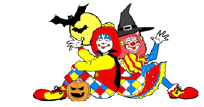The Big Apple Circus Clown Care Unit not only provided us with good pay, they paid us to attend monthly rehearsals which included artistic development and group therapy to help us along with sad hospital situations. A couple of months after I started, one of the therapy sessions addressed the death of Robin Williams, who was not only an improvisation genius, he also portrayed Patch Adams, the father of hospital clowning (who, thankfully, is still with us) in a movie.
It is not advisable to jump into hospital clowning without proper training by a structured organization (or clowns with hospital experience), as I’ve covered in many of my previous posts. One of the reasons for this is the emotional aspect of clowning in a hospital, no matter what demographics the patient population belongs to (ie. whether they are children or not). An organization like Big Apple recognizes that our task involves interaction with dying patients and grieving families, which requires both special training as well as an outlet for expressing emotions that may have been held in while in costume.
*The training we received helped us become aware of our surroundings in order to know when there is a sensitive situation nearby:
We could be dancing down the hallway, but we should be prepared to stop if we see a group of people huddled in a corner crying, since they’ve probably be given sad news.
*They taught us that, although we are primarily there to entertain, we are not to impose; we are to give the child what they need from us in the moment:
If we are in a room to cheer up a child, but all they want is to be heard while they express their fears, we must listen.
*As partners, we are to help each other if some sad situations become overwhelming during the shift:
If faced with a grieving family that requested the clowns for surviving younger siblings [who may not understand the situation] and one of the clowns is too emotional to continue, the partner clown should take command of the performance while the other supports or leaves if they have to.
In safe forum led by a professional therapist, the clowns should meet regularly (we met during monthly rehearsals) to express their feelings about the above situations, and maybe receive some input from more experienced clowns as to how to handle such moments. We must take care of our mental health as we do with our physical health, so that we may be prepared to offer our patients what we are able to give during a visit.
 Lucy E. Nunez has been a theatrical performer since 2002. She created Nurse Lulu for the Big Apple Circus Clown Care Unit at Nicklaus Children's Hospital in 2014. She was a resident clown there and at Baptist Children's Hospital. For more information please visit: www.sunnybearbuds.wix.com/buds
Lucy E. Nunez has been a theatrical performer since 2002. She created Nurse Lulu for the Big Apple Circus Clown Care Unit at Nicklaus Children's Hospital in 2014. She was a resident clown there and at Baptist Children's Hospital. For more information please visit: www.sunnybearbuds.wix.com/buds
